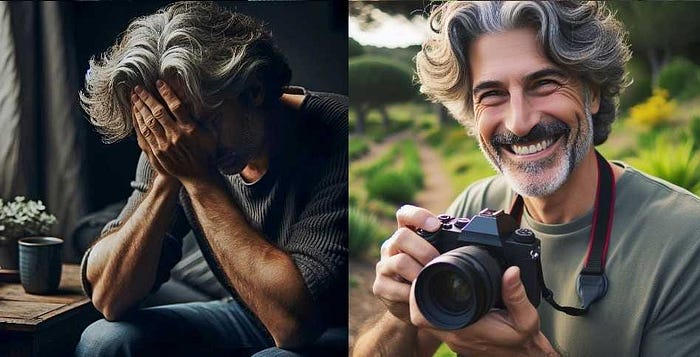Self-Forgiveness: A Journey Towards Better Mental Well-Being
Written on
Chapter 1: Understanding Self-Forgiveness
How many of you grapple with feelings of guilt? Do past mistakes haunt your thoughts, leaving you feeling sad or restless at night? I can relate to that struggle.
When it was time for me to rest at night, my mind often turned into a whirlwind, making it hard to fall asleep. Those sleepless hours took a toll on my mental well-being. My past seemed to have an upper hand. No matter how hard I tried to push aside my previous missteps, the memories and accompanying guilt relentlessly occupied my mind. Often, I felt like a terrible person, which was an uncomfortable state to be in.
While the actions I regret may not seem egregious to many—I've never committed any violent acts or severe wrongs—I still let people down over my 49 years. I've uttered hurtful words and made regrettable choices, some of which I’ll take to my grave.
Over time, I discovered how to release these burdens. As I've matured and gained insights, I’ve become more adept at navigating the path to self-forgiveness. Letting go of those painful memories has been a significant step toward self-acceptance. There are methods to alleviate the anguish of guilt if you commit to the process.
Some of my most profound reflections occur in the shower. It's a space where thoughts flow freely, sometimes leading me to revisit my past.
The first strategy to combat guilt is to swiftly acknowledge when your mind strays into that dark territory. Our brains are remarkable. One moment, you're enjoying a warm shower, and the next, your mind recalls a moment when you felt like the worst person alive. It's a real drain on your emotional resources.
Recognizing these thoughts and shutting them down is crucial. Personally, I possess a memory that functions like a high-definition recorder. I can recall intricate details from events that happened decades ago, which often astonishes my family.
While this ability can be beneficial, it also has a downside. Unwanted memories can surface, triggering a painful replay of regrettable moments. On more than one occasion, I found myself in tears.
However, I learned to quickly redirect my thoughts as soon as negativity creeps in. I tell myself, "Nope, let’s change the subject," and focus on something more positive or on upcoming events.
Making a conscious effort to block negative memories has facilitated my journey towards self-forgiveness. Sure, those thoughts may still pop up occasionally, but I no longer have to relive them in vivid detail. I remind myself that I have control over my thoughts.
This technique of diverting negative memories has proven effective for me about 80% to 90% of the time. But what about those moments when it doesn’t work?
As humans, we inevitably make mistakes. Our minds will occasionally wrestle with our hearts. Yet, one crucial point helps me regain my footing when I feel down about myself: You are not the same person who made those past errors.
Reflecting on my past, I remind myself that I was younger, less experienced, and lacking in wisdom when those events occurred. My brain was still developing during many of those experiences.
I've evolved; I've improved. Like most individuals, I’ve learned from my mistakes, and I handle situations with greater care now than I did in my youth. My relationships have enriched my understanding of kindness and respect, and parenting has instilled in me invaluable patience and wisdom.
Being a husband, father, and dog owner has allowed me to cultivate unconditional love. These experiences have reinforced my belief that I am worthy of forgiving myself for my past missteps.
You are not the individual who made those regrettable choices. If you had the kindness, patience, and wisdom you possess today back then, you would likely have made different decisions. It’s crucial to extend forgiveness to yourself for your past actions.
We all deserve compassion, grace, and love. If we seek these qualities from others, we must also grant them to ourselves. How can we expect kindness from family, friends, and acquaintances if we don't show it to ourselves?
At this stage in my life, I appreciate the person I am. I strive to spread positivity and acceptance. I respect and admire those who embody goodness. I treat everyone—adults, children, and animals—with love and kindness.
The few challenging days out of the 18,000 I’ve lived do not define me as a bad person. I am fundamentally good, and forgiving myself for past mistakes is essential for my happiness and mental health.
So, take this advice to heart the next time negative memories resurface: you deserve a peaceful night’s sleep. Concentrate on the positive memories that bring you joy and steer clear of the darker corners of your mind. You no longer reside there.

Chapter 2: Practical Steps to Self-Forgiveness
In "Learning Forgiveness for Yourself | 14 Day Mental Health Reset," discover practical strategies to begin your journey of self-forgiveness and mental health improvement.
In "The 4 Rs to Self Forgiveness: Cognitive Behavioral Therapy," learn about cognitive behavioral techniques to help you navigate the process of self-forgiveness.